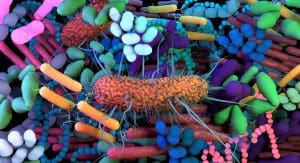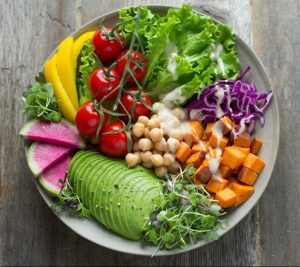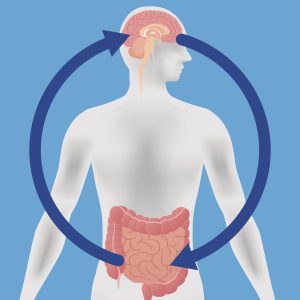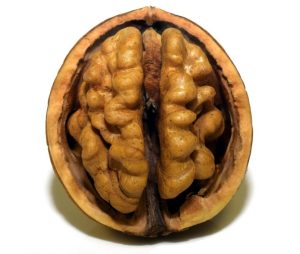Boulder is famous for its natural beauty, outdoor activities, and healthy lifestyle. But did you know that Boulder is also home to one of the largest and most comprehensive studies on the human gut microbiome? The American Gut Project, led by researchers at CU-Boulder and UC-San Diego, has analyzed the stool samples and dietary habits of over 10,000 volunteers from around the world and found some fascinating links between what we eat, how we feel, and what’s going on in our guts.

The Gut Microbiome: Linking Your Food to Your Mood
The gut microbiome is the collection of trillions of bacteria, fungi, viruses, and other microorganisms that live in our digestive tract. These microbes play a vital role in our health, affecting our digestion, immunity, metabolism, and even our mood and behavior. In fact, some scientists call the gut microbiome the “second brain,” because it communicates with the central nervous system through various pathways, including the vagus nerve, hormones, and neurotransmitters. Some of the neurotransmitters produced by the gut microbes, such as serotonin and dopamine, are involved in regulating our emotions, stress response, and cognitive functions. What’s more, about 80% of our body’s immune system lives in our gut – which makes sense when you consider the gut is where the food we eat — and the germs on it — interact with our bodies.
Dietary Diversity: Happy, Healthy Gut | Happy, Healthy You!
So, what does the American Gut Project tell us about how to keep our gut microbiome healthy and happy so it can help keep us happy and healthy in turn? The key is diversity.
One of the main findings of the American Gut Project is that the diversity of the gut microbiome is strongly influenced by the diversity of the plant foods we eat. In other words, the more different kinds of plants we consume, the more varied and beneficial our gut microbes become and the better impact our gut microbiome has on our physical and mental health. Specifically, the study found that people who ate at least 30 different plant foods per week had more diverse gut microbiomes as well as lower levels of inflammation, better immune function, and lower risk for obesity and chronic disease.
Eating 30 different plant foods a week was associated with:
- Lower levels of inflammation.
- Better immune function.
- Lower risk of obesity.
- Lower risk for chronic diseases.
What Counts As A Plant Food?
You might think that only vegetables qualify as “plant foods,” but luckily, you would be wrong. Plant foods can include fruits, vegetables, whole grains, legumes like beans and lentils (including coffee and cocoa beans), nuts, seeds, herbs, spices, and yes — even dark chocolate. Yes, chocolate is a plant! Just try to avoid added sugars, arterial sweeteners, or processed foods, which can harm your gut microbiome, mood, and overall health.
Dr. Bray’s Guide to Eating 30 Different Plants per Week
- Breakfast:
- Coffee, tea, or kombucha: 1 – 10 plants/spices.
- Oatmeal with berries, nuts, and cinnamon: 5 – 10 new plants.
- Tofu scramble with vegetables, spices, and hot sauce: 10 new plants.
- Morning Snack:
- Green juice or mixed berries with mixed nuts: 5 – 10 plants.
- Lunch:
- Colorful salad with veggies, beans, olives, and vinegar/oil dressing: 10 new plants.
- Tacos with a corn shell, vegetables, beans, salsa, hot sauce, and guacamole: 5 – 10 new plants.
- Afternoon Snack:
- Herbal Tea: 5 new plants (spices).
- A few squares of sugar-free dark chocolate with nuts: 2 – 3 plants.
- Post-workout smoothie made from greens, berries, edamame, and even a scoop of sugar-free, whole-food-plant-based meal powder: 5 – 20!
- Dinner:
- Grain bowl with quinoa, greens, veggies, tofu, nuts, and a dressing: 5 – 10 new plants.
- Evening/Bedtime Snack:
- Herbal Tea: 5 new plants.
- Popcorn with nutritional yeast, spices, and hot sauce: 3 – 5 plants.
- Small bowl of oats or grains with nut milk: 2 – 3 plants.
- On the Go?
- Wonder Press Co., SweetGreen, Crisp & Green, and CAVA are all great options!
Following these options, you can easily get 30 different plants in one day, much less in a week!

Why is Plant Diversity so Important for Gut Health?
Why is plant diversity so important for our gut health? The answer lies in the fiber and phytochemicals that plants provide. Fiber is the indigestible part of plant foods that feeds our gut microbes and helps them produce short-chain fatty acids (SCFAs), which are beneficial compounds that nourish our intestinal cells, lower inflammation, and modulate our appetite and blood sugar. Phytochemicals are the natural compounds that give plants their color, flavor, and aroma, and have various anti-inflammatory, antioxidant, and anti-microbial effects. Different plants have different types and amounts of fiber and phytochemicals, so eating a wide variety of them ensures that we get the full spectrum of benefits for our gut and overall health.
By following these tips, you can easily reach the goal of eating at least 30 different plant foods per week, and reap the rewards of a diverse and happy gut microbiome. Not only will you feel better physically, but you will also notice a positive change in your mood, stress level, and mental clarity. So, what are you waiting for? Start eating more plants today, and join the thousands of Boulder residents who are already part of the American Gut Project and contributing to the science of gut health. You can learn more about the project and how to participate at americangut.org or book a consult with Dr. Bray to get your 30 weekly plants in and reap the benefits today! Your gut and brain will thank you.
Sources:
- McDonald, D., Hyde, E., Debelius, J. W., Morton, J. T., Gonzalez, A., Ackermann, G., … & Knight, R. (2018). American Gut: an open platform for citizen science microbiome research. mSystems, 3(3), e00031-18.
- Valdes, A. M., Walter, J., Segal, E., & Spector, T. D. (2018). Role of the gut microbiota in nutrition and health. Bmj, 361, k2179.
- Ríos-Covián, D., Ruas-Madiedo, P., Margolles, A., Gueimonde, M., de Los Reyes-Gavilán, C. G., & Salazar, N. (2016). Intestinal short chain fatty acids and their link with diet and human health. Frontiers in microbiology, 7, 185.
- Liu, R. H. (2013). Health-promoting components of fruits and vegetables in the diet. Advances in nutrition, 4(3), 384S-392S.
- Scholey, A., & Owen, L. (2013). Effects of chocolate on cognitive function and mood: a systematic review. Nutrition reviews, 71(10), 665-681.
- Cani, P. D., & Van Hul, M. (2019). The role of the gut microbiota in energy metabolism and metabolic disease. Current pharmaceutical design, 15(13), 1546-1558.
- Lattimer, J. M., & Haub, M. D. (2010). Effects of dietary fiber and its components on metabolic health. Nutrients, 2(12), 1266-1289.
- Bazzano, L. A., Thompson, A. M., Tees, M. T., Nguyen, C. H., & Winham, D. M. (2011). Non-soy legume consumption lowers cholesterol levels: a meta-analysis of randomized controlled trials. Nutrition, metabolism and cardiovascular diseases, 21(2), 94-103.
- Ros, E., & Hu, F. B. (2013). Consumption of plant seeds and cardiovascular health: epidemiological and clinical trial evidence. Circulation, 128(5), 553-565.
- Aggarwal, B. B., & Prasad, S. (2011). Herbs and spices in health and disease prevention. Academic Press.





